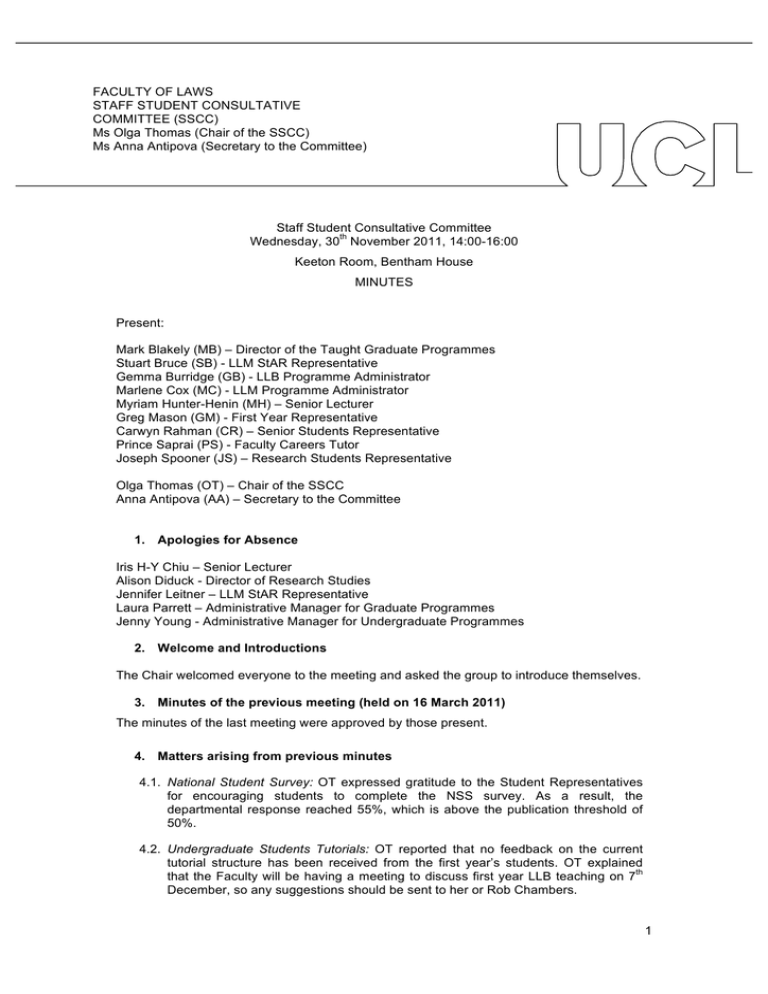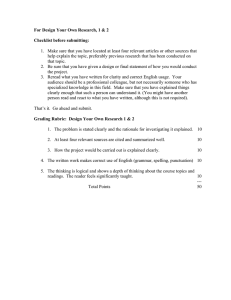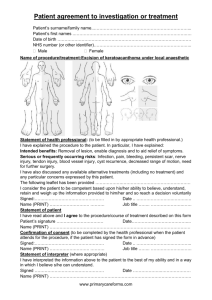FACULTY OF LAWS STAFF STUDENT CONSULTATIVE COMMITTEE (SSCC)
advertisement

FACULTY OF LAWS STAFF STUDENT CONSULTATIVE COMMITTEE (SSCC) Ms Olga Thomas (Chair of the SSCC) Ms Anna Antipova (Secretary to the Committee) Staff Student Consultative Committee th Wednesday, 30 November 2011, 14:00-16:00 Keeton Room, Bentham House MINUTES Present: Mark Blakely (MB) – Director of the Taught Graduate Programmes Stuart Bruce (SB) - LLM StAR Representative Gemma Burridge (GB) - LLB Programme Administrator Marlene Cox (MC) - LLM Programme Administrator Myriam Hunter-Henin (MH) – Senior Lecturer Greg Mason (GM) - First Year Representative Carwyn Rahman (CR) – Senior Students Representative Prince Saprai (PS) - Faculty Careers Tutor Joseph Spooner (JS) – Research Students Representative Olga Thomas (OT) – Chair of the SSCC Anna Antipova (AA) – Secretary to the Committee 1. Apologies for Absence Iris H-Y Chiu – Senior Lecturer Alison Diduck - Director of Research Studies Jennifer Leitner – LLM StAR Representative Laura Parrett – Administrative Manager for Graduate Programmes Jenny Young - Administrative Manager for Undergraduate Programmes 2. Welcome and Introductions The Chair welcomed everyone to the meeting and asked the group to introduce themselves. 3. Minutes of the previous meeting (held on 16 March 2011) The minutes of the last meeting were approved by those present. 4. Matters arising from previous minutes 4.1. National Student Survey: OT expressed gratitude to the Student Representatives for encouraging students to complete the NSS survey. As a result, the departmental response reached 55%, which is above the publication threshold of 50%. 4.2. Undergraduate Students Tutorials: OT reported that no feedback on the current tutorial structure has been received from the first year’s students. OT explained th that the Faculty will be having a meeting to discuss first year LLB teaching on 7 December, so any suggestions should be sent to her or Rob Chambers. 1 5. Chair person’s Business 5.1. OT welcomed MB to the Faculty as the new Director of the Taught Graduate Programmes. 6. UCL Coursework feedback survey result 6.1. OT explained that in 2010 UCL introduced service standards for coursework feedback. A feedback survey was conducted across UCL at the end of this year and a report presented to JSSC and the Education Committee. The key findings raised concerns with 56% of students not having been told how they would be given feedback, 46% of students not receiving feedback within the deadline specified in the service standards and only 25% of students rating the quality of feedback as good. At the same time, the Faculty of Laws’ students provided a significant response to the survey and demonstrated the highest level of satisfaction with regards to the quality and timeliness of feedback. 6.2. Comments: ST suggested that the comments should be provided in an essay itself, not in the separate section on the form. ST also reported that most of the academics do it anyway and he recommended that such practice should be encouraged across the Faculty. 6.3. PS explained that sometimes there are delays with providing feedback because it may take up to one week for the academics to receive an essay. Therefore, the students should look at the date received rather than the date submitted. 7. National Student Survey 2011 results 7.1. General feedback: OT explained that the NSS feedback demonstrates a very positive picture. In particular, OT reported that in the previous year there was a low level of satisfaction with IT resources – 68% with a national average of 82%. This year the Faculty scored 87 %, which is above the national average. Another improved area is assessment and feedback. Faculty scored 70%, which is above the national average of 67%. 7.2. Comments on Academic Support feedback: MHH asked in what time frame the academics should see students when they make an appointment and what are the students’ expectations in relation to the same. ST expressed concerns that contact hours are publicised sporadically and it is often not clear when they take place. ST explained that some academics put a note of their office hours on the door or publish them on the Moodle webpages, which is very helpful. However, not all of them do it and a more coherent office hours policy should be encouraged. 7.3. Part-time teaching fellows contact hours: JS asked what the official policy on contact hours for part-time teaching fellows is. JS explained that at the moment it is at the discretion of the individual tutors, however, the difficulty is that they do not have an office and it is not clear what the expectations are in terms of meeting students outside classes. OT explained there are no expectations to meet students outside classroom hours; however, she also appreciated that in practice a lot of students would ask questions after tutorials or in the corridors. Action Pont: OT – to explore different possibilities of standardising the publication of office hours and to look into implementing a fixed policy in terms of office hours for part-time teaching fellows. 8. Higher Education Achievement Record (HEAR) 8.1. OT explained that as a result of the recommendations included in the Burgess Report (Bologna process), UCL is required to implement the Higher Education 2 Achievement Record (HEAR) in 2011-12. The HEAR is a document that will record student academic achievement in more detail than the present transcript and will include more detailed module information and verifiable non-academic student achievement undertaken as a result of being a registered UCL student. 8.2. OT explained that she will collate the information relating to Departmental clubs and societies that have identifiable post holders and/or measurable significant contributions by individuals and to verifiable attendance and/or contribution to other activities such as widening participation activities, summer schools, activities held at, for example, Cumberland Lodge, etc. 8.3. Comments: ST – asked what will be the threshold of putting extra-curriculum activities on the transcript. In particular, at what stages participation in mooting competitions should be recognised. OT explained that she will explore it in consultation with the relevant academic officers. 8.4. MH – asked whether online exercises can be included in extra-curriculum achievements. OT explained that they will not be included as they form part of the course. ACTION POINT: Student Society Representatives to submit a list of student activities th that they think should be included on the Laws HEAR by 9 December. 9. UCL Key Skills System 9.1. OT explained that UCL introduced the new online Key Skill System for taught students. It is available at www.ucl.ac.uk/keyskills. The system will allow students to assess their transferrable skills and create action plan for improvements. Students can also invite their personal tutors to review the skills’ webpage for comments and feedback. It can also assist tutors with writing of references. However, OT reported that there has been a very low level of participation. 9.2. ST – explained that the system does not provide any meaningful benefits to students, so it is unlikely that it can justify time and effort put into maintaining the system. There is also no tangible link with the employability agenda. Further, there is a lack of awareness among the students. 9.3. PS – explained that it may be very beneficial as it can train students to write application forms as the questions usually revolve around transferrable skills. 10. LLM Questionnaires 10.1. AA urged the LLM student representatives to encourage LLM students to complete online course questionnaires. Action point: LLM Society Committee should encourage the LLM students to complete online course feedback forms. 11. Affiliation to UCLU 11.1. OT commended ST and Nick Grant, Student Law Society Treasurer, for a very clear and thorough report on the issue of Student Law Society’s affiliation to UCLU. OT explained that she spoke to UCLU officers and it became apparent that such affiliation will unfortunately not mitigate the financial and procedural risks, and therefore the matter should be closed. 11.2. OT explained that the current committee undertook significant steps to reduce the risks in terms of processes and finances. However, she appreciates that the current society’s structure cannot provide an internal solution. 3 11.3. ST expressed hopes that the issue of affiliation will not be raised again. ST asked for the formal record of the debate and a formal recognition that the issue is now closed, so that the new mechanism for addressing the financial and procedural risks will be explored. OT explained that a copy of the report and the discussions will be kept on file to inform any subsequent discussions in this regard. 12. Student Issues: 12.1. Essay-writing guidance: GM raised the issue of the lack of essay guidance for the first year’s students. 12.2. OT – explained that the assessment guide is available in the students’ handbook. 12.3. GB explained that there are several initiatives to assist students with essay-writing. First, there is UCL Royal Literary Fellows (RLF) scheme. The RLF Fellows are professional authors, and the principal aim of their work at UCL is help all UCL students to write effectively. Further, the Introduction to Law course includes a lecture specifically designed to address the essay writing. In addition, Jacqui Thomas is running regular “Better Legal Writing” lectures on Wednesday’s afternoons. 12.4. GM reported that some academics post sample first class essays on Moodle, which is very helpful. GM asked to encourage this practice for all courses. 12.5. Books availability: SB – raised concerns about the lack of availability of books in the library for the LLM readings. ST confirmed that the LLB students are having the same problems. PS reported that it is possible to create online reading lists and/or place the books on a short loan, and all tutors should be encouraged to do it, especially for the essential reading. PS explained that the online reading list must be sent to Martin Reid, laws subject librarian, during summer. 12.6. Research Students’ Issues: JS reported that there are inadequate IT facilities in the Research Students’ room with old computers and outdated software which is no longer used by the rest of the Faculty. In addition, JS reported that some research students expressed concerns because the Research Students’ Room was th closed at a very short notice due to the Faculty’s event on 16 November, which caused a lot of inconvenience. ACTION POINT – JS to raise the issues of IT facilities with Ian Peel. 4


